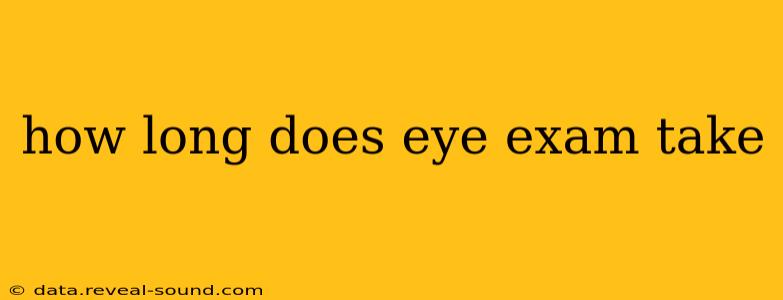How Long Does an Eye Exam Take? A Comprehensive Guide
The length of an eye exam can vary significantly depending on several factors. While a routine check-up might be relatively quick, a comprehensive exam could take considerably longer. Understanding what to expect can help alleviate any anxiety and ensure you're prepared for your appointment.
What influences the duration of your eye exam?
Several factors contribute to the overall time commitment for your eye exam. These include:
- Type of exam: A basic vision screening will differ greatly from a comprehensive dilated eye exam.
- Your individual needs: Pre-existing conditions, age, and specific concerns will all influence the exam's length.
- Doctor's schedule: While unlikely to be a major factor, the doctor's schedule and appointment availability can influence how much time they can dedicate to you.
- Technology used: The equipment used by the optometrist or ophthalmologist can affect the overall time taken. Newer technology may speed up certain processes.
What Happens During a Routine Eye Exam?
A standard eye exam generally involves the following steps:
- Visual acuity test: This classic eye chart test assesses your ability to see at various distances.
- Refraction test: This determines the correct prescription for glasses or contact lenses by using tools to measure how your eyes focus light.
- Eye muscle and alignment check: This assesses how your eyes work together and if you have any issues with eye coordination or alignment (like strabismus).
- Intraocular pressure check: This tests for glaucoma using a device called a tonometer.
- Ophthalmoscopy: This involves a brief examination of the back of your eye (retina, optic nerve) using a special device.
This entire process typically takes 30 to 45 minutes. However, this is a general estimate; the actual time can fluctuate depending on individual circumstances.
How Long Does a Comprehensive Eye Exam Take?
A comprehensive eye exam is far more in-depth than a routine screening. It may include all the elements of a basic exam, plus additional tests such as:
- Dilated eye exam: Your pupils are dilated using eye drops to allow the doctor to get a clearer view of the back of your eye. This significantly extends the exam time, as the dilation process itself takes time and your eyes will be sensitive to light afterward.
- Advanced imaging: This could include optical coherence tomography (OCT) or other imaging techniques to create detailed images of the eye's internal structures. These tests add extra time to the exam.
- Detailed medical history review: The doctor will likely take a more extensive medical history to assess risk factors and address specific concerns.
- Assessment for specific conditions: If you have a pre-existing condition or suspect a particular problem, the doctor may spend more time evaluating that area.
A comprehensive exam could take 1 to 2 hours, or even longer in complex cases. The dilation process alone adds considerable time, as your eyes need time to recover their normal sensitivity.
How Long Does a Child's Eye Exam Take?
Eye exams for children can often take longer than those for adults. This is because children may need additional time to cooperate with the various tests, and the doctor may need to take extra care in assessing their developing vision system. Expect an exam for a child to potentially take 45 minutes to an hour, or even longer depending on the child's age and cooperation.
What if my exam takes longer than expected?
Don't worry if your eye exam takes a bit longer than anticipated. The doctor is likely taking the time to ensure a thorough evaluation of your eye health. If you have any concerns about the time taken, don't hesitate to politely ask the doctor or staff for an explanation.
In conclusion, the duration of an eye exam is highly variable. While a basic screening might only take 30-45 minutes, a comprehensive exam, particularly one with dilation, could easily stretch to an hour or more. Preparation and a clear understanding of what to expect can help make the process smoother and less stressful. Remember to always communicate with your eye care professional if you have any questions or concerns.
